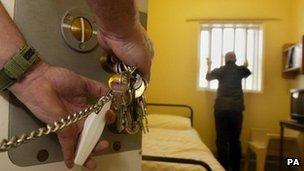Carloway review says end corroboration in crime cases
- Published
- comments

The review is proposing a radical overhaul of the criminal justice system
A report into Scotland's justice system has recommended that corroborated evidence will no longer be required in criminal cases.
Lord Carloway, who undertook the major review, also said suspects should be given the right to see a lawyer.
His review was set up after a UK Supreme Court judgement stopped police questioning suspects who had not been offered access to a lawyer.
Lord Carloway said the criminal law should be "re-cast" for modern society.
Overall, the judge made 76 recommendations, external, including;
a simplified, unitary system of arrest, on reasonable grounds for suspicion and detention
an arrest will trigger a set of rights including access to a lawyer
any proceedings against the suspect constitute a fair trial
suspects being charged should be brought before the court within 36 hours of arrest
and a less rule-bound approach to the evidence gathered with the general requirement for corroboration being dropped
High Court judge, Lord Carloway, says the requirement for evidence to be corroborated in Scottish criminal cases is archaic
Justice Secretary Kenny MacAskill requested the review in October last year following the UK Supreme Court's decision to uphold an appeal by Peter Cadder, external.
It ruled that police could not question a suspect without offering him or her access to a solicitor first.
On launching his report, the judge said: "The task facing the review was to identify how criminal law and practice in Scotland, from the moment a suspect is identified right through to the consideration of any appeal and beyond, should be re-cast to meet the challenges and expectations of modern society and legal thinking.
"The report recognizes that it is not starting from a blank sheet of paper. It cannot effect total reconstruction, riding roughshod over sound existing traditions.
"The recommendations therefore seek to mould new elements and new thinking with existing practices in order to create a more robust, revitalised and modern system.
"In particular, they seek to re-structure and reinforce the system's foundations by instilling a human rights approach in larger measure and at greater depth. The aim is a system that not only surpasses minimum requirements today, but also stands up to developments for the foreseeable future."
The review held 77 meetings, undertook three visits to see the current Scottish legal system at work and carried out a public consultation which received 50 responses.
Long term reform
Lord Carloway also spoke to experts from Canada, New Zealand, Sweden and Germany.
Mr MacAskill welcomed Lord Carloway's report, saying the government continued to work closely with criminal justice partners to ensure that Scotland had a modern robust justice system "fit for the 21st Century".
He added: "The Carloway Review builds upon the actions we took last October and will frame longer term reform.
"The recommendations are far reaching and, while respectful to traditional systems that have served us well over centuries, seek to reshape and respond to present-day obligations and expectations."
Scottish Labour's Johann Lamont said that abolishing corroboration in all criminal cases was a "profound and fundamental change to Scots law".
But she added: "Lord Carloway has made a strong and compelling case for change that deserves further debate and careful consideration.
"On the right to remain silent, we note Lord Carloway's conclusion that it is important that the right to a fair trial is not compromised but will study the evidence in the report that informs this point of view.
"We must have the courage to make bold changes to strengthen our legal system so it better serves the victims of crime, but it is absolutely essential that any new rules ensure an appropriate sufficiency of evidence before prosecutions proceed. A careful balance must be struck."
Fair trial
Scottish Conservative Justice spokesman David McLetchie said he welcomed the changes, if abolishing corroborating meant more people could be brought to trial.
He added: "In particular it may bring justice to women who have been the victims of serious sexual assault.
"However, we must not forget the presumption of innocence which is the cornerstone of our justice system. Whatever crime an individual may have been charged with, he or she must receive a fair trial and guilt must be proven beyond all reasonable doubt."
Scottish Liberal Democrat justice spokesperson Alison McInnes said she too welcomed the report.
She added: "Protecting peoples' rights and ensuring a fair trial must be at the heart of any reforms. Our justice system must be robust, and it must be fully compliant with the European Convention on Human Rights.
"Lord Carloway's report has those goals at its core, however, the changes put forward are both radical and substantial and so will need further detailed study."
- Published17 November 2011
- Published8 April 2011
- Published9 February 2011